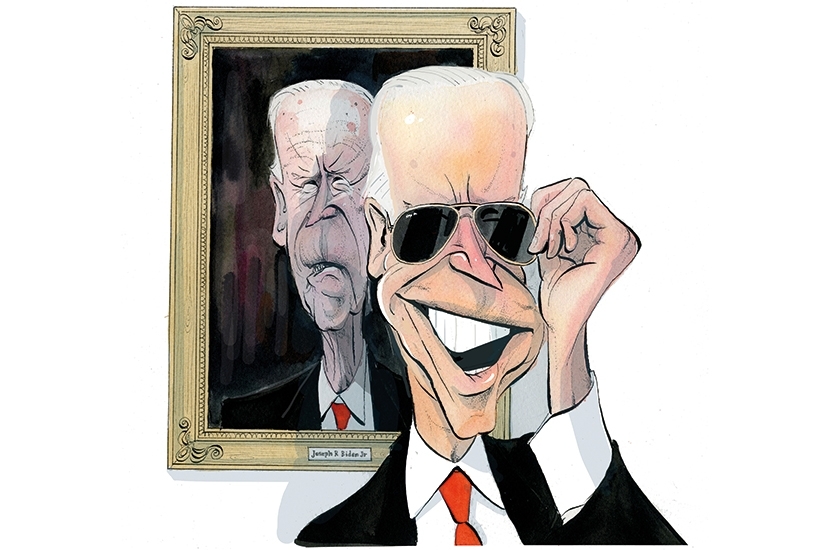Boris Johnson is set for a vaccine boost next week when local election results start rolling in. As James Forsyth explains in this week’s magazine, the vaccine rollout is forefront in voters’ minds, with seven out of ten now inoculated or even fully jabbed up. For all the chaos raging around Johnson, with accusations from his former allies and long-term opponents coming in thick and fast, the PM looks set to retain his support where it matters: at the polling station.
Can the same be said for Joe Biden? Across the pond, America is experiencing an equally successful vaccine rollout, as both the US and the UK hover around the top five countries worldwide for their rates of vaccination. Over 200 million doses have been administered in the US, and all adults are now eligible to receive their jabs. As today marks his first 100 days in the Oval Office, is Biden benefitting from a similar vaccine bounce?
Unlike Johnson, there is no imminent election to confirm suspicions one way or another. But when it comes to his handling of Covid-19, the President appears to be in relatively good standing. Polls conducted around his first 100 days find Biden receives his best scores for his approach to the pandemic, with approval ratings over 60 per cent. CNN’s latest poll shows 30 per cent of Republicans approving of his actions on Covid: far below the 97 per cent approval rating dished out by Democrats, but ‘16 points higher than GOP approval for Biden on any other issue tested in the poll.’
The public is also broadly supportive of Biden’s most recent Covid stimulus package, which sent another round of cheques out to Americans earning below $80,000 a year. Polling finds 70 per cent of the public back the American Rescue Plan, including 60 per cent of Republicans.
But don’t mistake this for a more unified America. Biden’s approval ratings on his 100th day, while notably above Donald Trump’s 42 per cent, fall far short of his most recent predecessors. The polling analysts at Five Thirty Eight put Biden’s overall approval rating at 53.8 per cent, compared to Barack Obama’s 60.8 per cent, George W. Bush’s 57.6 per cent, Bill Clinton’s 58.2 per cent, George H.W. Bush’s 58 per cent, and Ronald Reagan’s 67.6 per cent.
This speaks to the stark polarisation that continues to dominate America. According to the think tank Pew Research, 89 per cent of Trump supporters and 90 per cent of Biden supporters said the election of the other would lead to ‘lasting harm’ in the United States and that they would be ‘very concerned’ about the direction of the country under their non-preferred leader. There’s not much optimism this will improve, either. A measly 21 per cent of Americans told Pew Research that they thought the relationship between Republicans and Democrats would get better in 2021.
Some of this explains why support for Biden’s non-Covid announcements, including the $2.3 trillion pledge on infrastructure spending, is a far more mixed bag than the substantial support for his Covid stimulus package. But as I say in the Telegraph, even more basic politics is at play. Americans are well aware that nothing comes without a cost. While appetite for more public spending appears to be growing, Biden’s series of spending announcements give the impression the President has no limit in mind — and he’s running out of money to grab. Having already committed money raised through planned corporation tax hikes, income tax hikes, and capital gain hikes, it’s becoming increasingly unconvincing that Biden can make good on his pledge not to increase taxes for 95 per cent of American taxpayers.
In many ways the President is lucky: while he inherited a pandemic-stricken country, he also started the job with multiple working vaccines and a rollout underway. The US is set for an economic boom as it recovers from the pandemic, almost regardless of how Biden intervenes. Damage caused by tax hikes and increased red tape may take longer to reveal itself, as a wave of economic and social activity all but guarantees a boost to GDP.
But Biden has more than a year until the midterm elections, and while America is likely to be riding an economic wave, the vaccine rollout may start to feel like part of its past, leaving plenty of time for normal political discourse to resume. With the electorate still fundamentally split about its vision for America, the razor tight margins in Congress (with Republicans one seat away from taking back the Senate), it would only take the loss of a few seats for Biden’s agenda to fall apart, unable to do much in the second part of his first term, without achieving bipartisan support.
As far as Covid goes, the public appears to remain on the President’s side. But as America comes out of the pandemic, Biden will have the much harder sell to bring sceptical parts of the public on board with his agenda. In this sense, his first 100 days in the Oval Office can only tell us so much about his broader appeal — by next year, it may not be his handling of the pandemic, but everything else, that voters are interested in.






Comments